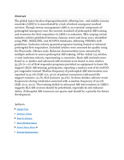| dc.contributor.author | Pine, Haleigh | |
| dc.contributor.author | Eisner, Zachary J. | |
| dc.contributor.author | Delaney, Peter G. | |
| dc.contributor.author | Ogana, Simon Ochieng | |
| dc.contributor.author | Okwiri, Dinnah Akosa | |
| dc.contributor.author | Raghavendran, Krishnan | |
| dc.date.accessioned | 2022-05-18T07:29:32Z | |
| dc.date.available | 2022-05-18T07:29:32Z | |
| dc.date.issued | 2022-02-25 | |
| dc.identifier.uri | https://link.springer.com/article/10.1007/s00268-022-06481-5 | |
| dc.identifier.uri | htpps://doi.org/10.1007/s00268-022-06481-5 | |
| dc.identifier.uri | http://ir-library.mmust.ac.ke:8080/xmlui/handle/123456789/2052 | |
| dc.description.abstract | The global injury burden disproportionately affecting low- and middle-income countries (LMICs) is exacerbated by a lack of robust emergency medical services. Though airway management (AM) is an essential component of prehospital emergency care, the current standard of prehospital AM training and resources for first responders in LMICs is unknown. This scoping review includes articles published between January 2000 and June 2021, identified using PMC, MEDLINE, and SCOPUS databases, following PRISMA-ScR guidelines. Inclusion criteria spanned programs training formal or informal prehospital first responders. Included articles were assessed for quality using the Newcastle–Ottawa scale. Relevant characteristics were extracted by multiple authors to assess prehospital AM training. Of the initial 713 articles, 17 met inclusion criteria, representing 11 countries. Basic AM curricula were found in 11 studies and advanced AM curricula were found in nine studies. 35.3% (n = 6) of first responder programs provided no equipment to basic life support (BLS) AM training participants, reporting a median cost of $7.00USD per responder trained. Median frequency of prehospital AM intervention was reported in 31.0% (IQR: 6.0, 50.0) of patient encounters (advanced life support trainees: 12.1%, BLS trainees: 32.0%). In three studies, adverse event frequencies during intubation occurred with a median frequency of 22.0% (IQR: 21.0, 22.0). The training deficit in advanced AM interventions in LMICs suggests BLS AM courses should be prioritized, especially in sub-Saharan Africa. Prehospital AM resources are sparse and should be a priority for future development. | en_US |
| dc.language.iso | en | en_US |
| dc.publisher | World Journal of Surgery | en_US |
| dc.subject | Prehospital, Airway Management, Trauma Patients, First Responders, Six Sub-Saharan, African Countries, Five, Low- and Middle-Income, Countries, Scoping, Review | en_US |
| dc.title | Prehospital Airway Management for Trauma Patients by First Responders in Six Sub-Saharan African Countries and Five Other Low- and Middle-Income Countries | en_US |
| dc.title.alternative | A Scoping Review | en_US |
| dc.type | Article | en_US |

